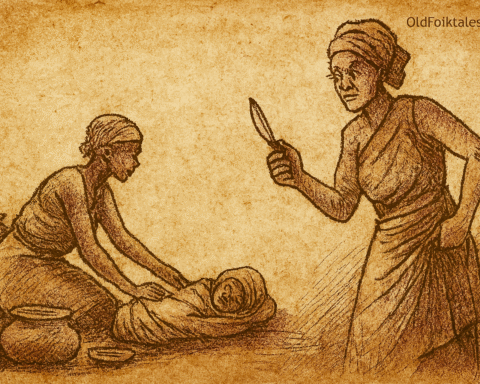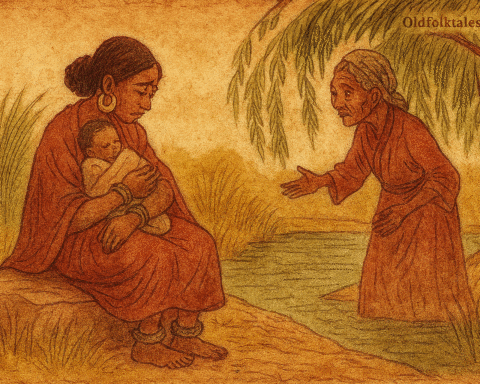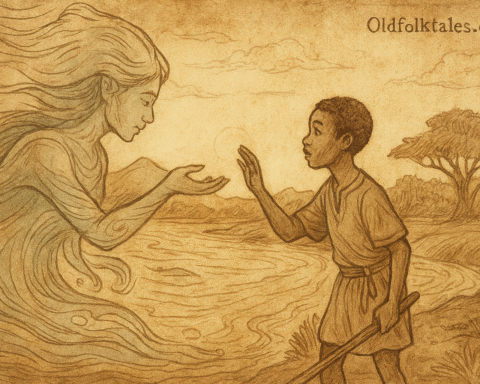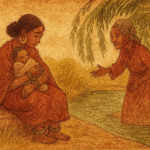In the verdant hills of Cameroon, where palm trees swayed gently in the warm African breeze and the red earth bore witness to generations of ancestral wisdom, there lived a woman named Ngomba whose heart was as vast as the endless sky above. Her modest mud-brick home sat at the edge of the village, its thatched roof weathered by countless seasons of rain and sunshine, yet it radiated warmth that seemed to draw weary travelers from miles around.
Ngomba possessed very little in terms of worldly wealth. Her granary held barely enough grain to sustain her through the lean months, and her cooking pot often contained nothing more than a thin porridge made from whatever meager provisions she could gather. The dry seasons had been particularly harsh in recent years, leaving even the most prosperous families in the village struggling to fill their bellies. Yet despite her own pressing needs, Ngomba’s generous spirit never wavered, and she would readily share her last handful of rice with anyone who appeared at her doorstep in need.
Her neighbors, however, were cut from different cloth entirely. They watched Ngomba’s acts of kindness with a mixture of bewilderment and disdain, whispering among themselves that her generosity was nothing more than foolish waste. These were people who carefully counted every grain of millet, who turned away hungry strangers with hardened hearts, and who believed that charity was a luxury they simply could not afford. They hoarded their resources jealously, convinced that Ngomba’s selflessness would surely lead to her ruin.
Also read: How the Leopard Got His Spots
“That woman will starve herself to death with all her giving,” they would mutter as they watched her share her meager meals with passing travelers. “Mark our words her foolish kindness will be the end of her.”
One scorching afternoon, when the sun blazed mercilessly overhead and the very air seemed to shimmer with heat, three strangers appeared at the edge of the village. They were unlike any travelers the people had ever seen before their clothes were tattered and dusty from long journeys, their faces gaunt with hunger, and their eyes held a depth that seemed to pierce straight through to one’s soul. They moved with a peculiar grace despite their apparent weariness, and there was something about their presence that made even the boldest villagers step back and avert their gaze.
The strangers made their way through the village, stopping at each home to request food and shelter. But door after door slammed shut in their faces as the residents, protecting their precious stores, refused to spare even the smallest morsel. Some pretended not to be home, hiding behind their wooden shutters while the strangers knocked patiently at their doors. Others peered out suspiciously before declaring loudly that they had nothing to share, their voices echoing with the hardness of their hearts.
When the three weary travelers finally reached Ngomba’s humble dwelling, she was sitting outside her home, carefully rationing the last of her grain into tiny portions that would have to sustain her for the coming week. Upon seeing the strangers approach, she immediately set aside her concerns about her own survival and rose to greet them with the warm smile that had become her trademark throughout the village.
“Welcome, travelers,” she said, her voice soft with genuine compassion. “You look tired and hungry. Please, come and rest in the shade of my home.”
The strangers accepted her invitation gratefully, settling themselves beneath the broad leaves of the banana tree that grew beside her doorway. Without hesitation, Ngomba gathered the grain she had just so carefully portioned and began preparing a meal with it, adding precious palm oil and the last of her dried fish to create a feast that represented everything she had left in the world.
As she cooked, the strangers watched her with intense curiosity, noting how she gave freely without any expectation of reward or even gratitude. They observed how her hands moved with practiced kindness, how her face remained peaceful despite the sacrifice she was making, and how her spirit seemed to glow with an inner light that no amount of material wealth could ever produce.
When the meal was ready, Ngomba served her guests the largest portions, keeping only the smallest amount for herself. She insisted they eat their fill while she went about preparing sleeping mats for them, ensuring their comfort even as she worried privately about how she would survive the coming days with no food remaining.
The next morning, the strangers prepared to continue their journey, but before departing, they revealed their true nature to the astonished woman. They were not ordinary travelers at all, but spirits who had taken human form to test the hearts of mortals. They had witnessed both the selfishness of her neighbors and the purity of her own generous soul.
“Ngomba,” spoke the eldest of the spirits, his voice now resonating with otherworldly power, “your kindness has not gone unnoticed. While others turned us away in our time of need, you gave us everything you had without thought for yourself. Such selflessness deserves reward.”
With those words, the spirits blessed her humble home, and Ngomba watched in amazement as her empty granary filled to overflowing with the finest grain, her bare walls adorned themselves with beautiful cloth, and her simple clay pots transformed into vessels of gleaming bronze. Her poverty had been replaced with abundance that would last her for the rest of her days.
Word of Ngomba’s miraculous good fortune spread quickly throughout the village, igniting envy and cunning calculation in the hearts of her neighbors. They began plotting how they too might receive such divine reward, completely missing the essential truth that lay at the heart of the blessing.
When more strangers appeared in the village weeks later, these calculating neighbors rushed to offer hospitality, but their motives were transparent and their kindness hollow. They gave grudgingly, constantly calculating the potential return on their investment, and their hearts remained as hard as stone even as they performed acts of false generosity.
The spirits, seeing through their deception immediately, rewarded their selfishness with appropriate consequences. Their stored grain turned to dust, their treasured possessions crumbled away, and they found themselves poorer than they had ever been before.
Moral Lesson
This powerful folktale teaches us that true kindness flows from a pure heart and genuine compassion for others, never from selfish calculation or expectation of reward. The spirits blessed Ngomba not because she fed them, but because her generosity came from authentic love and selflessness. When we give from the heart, without thought of personal gain, we open ourselves to blessings far greater than anything we could have imagined. Conversely, those who practice false kindness motivated by greed will find that their selfishness ultimately leads to their own downfall.
Knowledge Check
Q1: What made Ngomba different from her neighbors in this African folktale? A1: Ngomba possessed a genuinely generous heart and shared her meager resources freely with those in need, while her neighbors were selfish and hoarded their possessions, refusing to help hungry travelers.
Q2: Who were the mysterious strangers that tested the village in this African tale? A2: The strangers were actually spirits in disguise who had taken human form to test the hearts of mortals, observing who would show true kindness versus selfishness.
Q3: What was Ngomba’s situation when she chose to help the spirit-strangers? A3: She was extremely poor, possessing only her last handful of grain that she had carefully rationed to survive the coming week, yet she used it all to prepare a generous meal for the strangers.
Q4: How did the spirits reward Ngomba’s authentic kindness in this story? A4: They filled her empty granary with abundant grain, adorned her humble home with beautiful cloth, and transformed her simple possessions into valuable items, ensuring prosperity for life.
Q5: What happened when Ngomba’s neighbors tried to imitate her generosity? A5: Their false kindness, motivated by greed rather than genuine compassion, was punished by the spirits who turned their grain to dust and made them poorer than before.
Q6: What does this folktale teach about the nature of true versus false generosity? A6: True generosity flows from authentic compassion without expectation of reward, while false kindness motivated by selfish calculation leads to punishment and loss rather than blessing.






